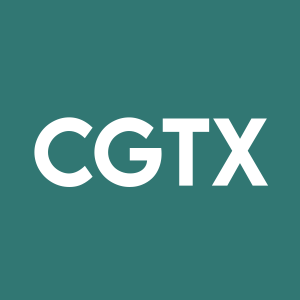Cognition’s Positive Phase 2 ‘SHIMMER’ Study of Zervimesine (CT1812) in Dementia with Lewy Bodies (DLB) will be Presented in a Podium Presentation at ILBDC
Rhea-AI Summary
Cognition Therapeutics (NASDAQ: CGTX) announced positive Phase 2 'SHIMMER' study results for zervimesine (CT1812) in treating dementia with Lewy bodies (DLB). The study, involving 130 adults with mild-to-moderate DLB over six months, met its primary safety and tolerability endpoints with significant therapeutic improvements.
Key results showed zervimesine-treated participants performed:
- 86% better on behavioral outcomes (NPI A-L)
- 52% better on activities of daily living
- 91% reduction in cognitive fluctuations
- 62% better motor function
The drug demonstrated effectiveness in reducing hallucinations, delusions, anxiety, and agitation - key DLB symptoms. Care partners reported reduced distress levels, and patients showed improved ability to maintain daily living activities. The treatment exhibited a favorable safety profile with mostly mild to moderate adverse events.
Positive
- Met primary endpoint of safety and tolerability in Phase 2 trial
- 86% improvement in behavioral outcomes vs placebo
- 52% better preservation of daily living activities
- 91% reduction in cognitive fluctuations
- 62% improvement in motor function
- Favorable safety profile with mostly mild/moderate adverse events
Negative
- None.
News Market Reaction
On the day this news was published, CGTX gained 0.99%, reflecting a mild positive market reaction.
Data tracked by StockTitan Argus on the day of publication.
– Study demonstrated strong therapeutic responses across behavioral, functional, cognitive, and movement measures in patients with mild-to-moderate DLB –
– Zervimesine-treated participants tested
PURCHASE, N.Y., Jan. 30, 2025 (GLOBE NEWSWIRE) -- Cognition Therapeutics, Inc., (the Company or Cognition) (NASDAQ: CGTX), a clinical stage company developing drugs that treat neurodegenerative disorders, announced that James E. Galvin, MD, MPH will present topline results from the ‘SHIMMER’ study of zervimesine (CT1812) in dementia with Lewy bodies during an oral presentation at the International Lewy Body Dementia Conference (ILBDC). Dr. Galvin is director of the Comprehensive Center for Brain Health at the University of Miami Miller School of Medicine and was the study director and principal investigator on the SHIMMER study grant from the National Institute of Aging. The presentation is taking place on January 31, 2025 at 2:00 pm local time in Amsterdam, Netherlands.
“Dr. Galvin’s presentation is an important opportunity to educate an international audience of advocates, scientists and physicians about the impressive efficacy signals that were observed in participants treated with zervimesine (CT1812),” stated Anthony O. Caggiano, MD, PhD, Cognition’s CMO and head of R&D. “DLB is a complex disease with an array of physical and psychological symptoms that can progress rapidly and are ultimately fatal. Zervimesine-treated participants tested higher across behavioral, cognitive, functional and motor symptoms than their placebo-treated counterparts.”
The Phase 2 SHIMMER study randomized 130 adults with mild-to-moderate DLB who took a daily oral dose of zervimesine or placebo for six months. The study met its primary endpoint of safety and tolerability. As will be presented at ILBDC, zervimesine-treated DLB patients scored an average of
Participants treated with zervimesine also preserved
"Older adults with DLB are often placed in care facilities not because of memory issues, but due to the severity of neuropsychiatric or motor symptoms that overwhelm their caregivers,” explained Dr. Galvin. “Patients on zervimesine had fewer cognitive fluctuations and showed better motor control than placebo-treated patients. These positive changes were reflected in zervimesine-treated patients’ ability to dress, feed and bathe themselves and hold conversations, which are activities of daily living reflected in the ADCS-ADL score. The reduction in these symptoms may allow people with DLB to live at home with the assistance of their care partners and be present in their loved one's lives longer.”
Zervimesine demonstrated a favorable safety and tolerability profile in SHIMMER, with most treatment-related adverse events being mild or moderate, consistent with previous clinical experience.
| Cognition Therapeutics at ILBDC: | |
| Title: | Results from COG1201: A Proof-of-Concept Study of CT1812 in Participants with Mild-to-Moderate Dementia with Lewy Bodies |
| Authors: | Galvin JE, Tolea MI, Fargo KN, Taylor A, Scharre DW, Sha S, Hamby ME, Iaci JF, Grundman M, Caggiano AO |
Dr. Galvin’s slide presentation will be available on the Cognition Therapeutics website following the presentation.
About the SHIMMER Study
The SHIMMER study (NCT05225415) is an exploratory double-blind, placebo-controlled Phase 2 clinical trial that enrolled 130 adults with mild-to-moderate DLB, who were randomized to either daily oral doses of zervimesine (100 mg or 300 mg) or placebo for six months. A total of 88 participants were randomized to the two treatment arms and 42 to the placebo arm. Assessments were conducted throughout the study using a number of tools, including the Neuropsychiatric Inventory (NPI) to measure changes in hallucinations, anxiety and delusions; the Clinician Assessment of Fluctuation (CAF) to measure the frequency and duration of cognitive fluctuations; the Montreal Cognitive Assessment (MoCA) and Cognitive Drug Research Battery (CDR), which track cognitive performance; and the MDS-Unified Parkinson’s Disease Rating Scale (MDS-UPDRS) Part III, an objective assessment of parkinsonism.
The SHIMMER study is supported by a grant award from the National Institute on Aging of the National Institutes of Health (NIH) totaling approximately
About Zervimesine (CT1812)
Zervimesine is an experimental orally delivered small molecule oligomer antagonist designed to penetrate the blood-brain barrier and bind selectively to the sigma-2 (σ-2) receptor complex, which is involved in the regulation of key cellular processes. These processes are disrupted by toxic interaction with Aβ or α-synuclein oligomers, oxidative stress and other disease drivers. The ensuing damage to sensitive synapses can progress to a loss of synaptic function, which manifests as cognitive impairment and disease progression.
About Cognition Therapeutics, Inc.
Cognition Therapeutics, Inc., is a clinical-stage biopharmaceutical company discovering and developing innovative, small molecule therapeutics targeting age-related degenerative disorders of the central nervous system and retina. We currently are investigating our lead candidate, zervimesine (CT1812), in clinical programs in dementia with Lewy bodies (DLB) and Alzheimer’s disease, including the ongoing START study (NCT05531656) in early Alzheimer’s disease. We believe zervimesine and our pipeline of σ-2 receptor modulators can regulate pathways that are impaired in these diseases that are functionally distinct from other approaches for the treatment of degenerative diseases. More about Cognition Therapeutics and our pipeline can be found at https://cogrx.com.
Forward-Looking Statements
This press release contains forward-looking statements within the meaning of The Private Securities Litigation Reform Act of 1995. All statements contained in this press release or made during the conference, other than statements of historical facts or statements that relate to present facts or current conditions, including but not limited to, statements regarding our product candidates, including zervimesine (CT1812), and any expected or implied benefits or results, including that initial clinical results observed with respect to zervimesine will be replicated in later trials and our future clinical development plans, and statements regarding our clinical trials of zervimesine and any analyses of the results therefrom, are forward-looking statements. These statements, including statements relating to the timing and expected results of our clinical trials involve known and unknown risks, uncertainties and other important factors that may cause our actual results, performance, or achievements to be materially different from any future results, performance, or achievements expressed or implied by the forward-looking statements. In some cases, you can identify forward-looking statements by terms such as “may,” “might,” “will,” “should,” “expect,” “plan,” “aim,” “seek,” “anticipate,” “could,” “intend,” “target,” “project,” “contemplate,” “believe,” “estimate,” “predict,” “forecast,” “potential” or “continue” or the negative of these terms or other similar expressions. We have based these forward-looking statements largely on our current expectations and projections about future events and financial trends that we believe may affect our business, financial condition, and results of operations. These forward-looking statements speak only as of the date of this press release and are subject to a number of risks, uncertainties and assumptions, some of which cannot be predicted or quantified and some of which are beyond our control. Factors that may cause actual results to differ materially from current expectations include, but are not limited to: competition; our ability to secure new (and retain existing) grant funding; our ability to grow and manage growth, maintain relationships with suppliers and retain our management and key employees; our ability to successfully advance our current and future product candidates through development activities, preclinical studies and clinical trials and costs related thereto; uncertainties inherent in the results of preliminary data, pre-clinical studies and earlier-stage clinical trials being predictive of the results of early or later-stage clinical trials; the timing, scope and likelihood of regulatory filings and approvals, including regulatory approval of our product candidates; changes in applicable laws or regulations; the possibility that the we may be adversely affected by other economic, business or competitive factors, including ongoing economic uncertainty; our estimates of expenses and profitability; the evolution of the markets in which we compete; our ability to implement our strategic initiatives and continue to innovate our existing products; our ability to defend our intellectual property; the impacts of ongoing global and regional conflicts on our business, supply chain and labor force; and the risks and uncertainties described more fully in the “Risk Factors” section of our annual and quarterly reports filed with the Securities & Exchange Commission and are available at www.sec.gov. These risks are not exhaustive and we face both known and unknown risks. You should not rely on these forward-looking statements as predictions of future events. The events and circumstances reflected in our forward-looking statements may not be achieved or occur, and actual results could differ materially from those projected in the forward-looking statements. Moreover, we operate in a dynamic industry and economy. New risk factors and uncertainties may emerge from time to time, and it is not possible for management to predict all risk factors and uncertainties that we may face. Except as required by applicable law, we do not plan to publicly update or revise any forward-looking statements contained herein, whether as a result of any new information, future events, changed circumstances or otherwise.
| Contact Information: Cognition Therapeutics, Inc. info@cogrx.com | Casey McDonald (media) Tiberend Strategic Advisors, Inc. cmcdonald@tiberend.com | Mike Moyer (investors) LifeSci Advisors mmoyer@lifesciadvisors.com |
This press release was published by a CLEAR® Verified individual.








